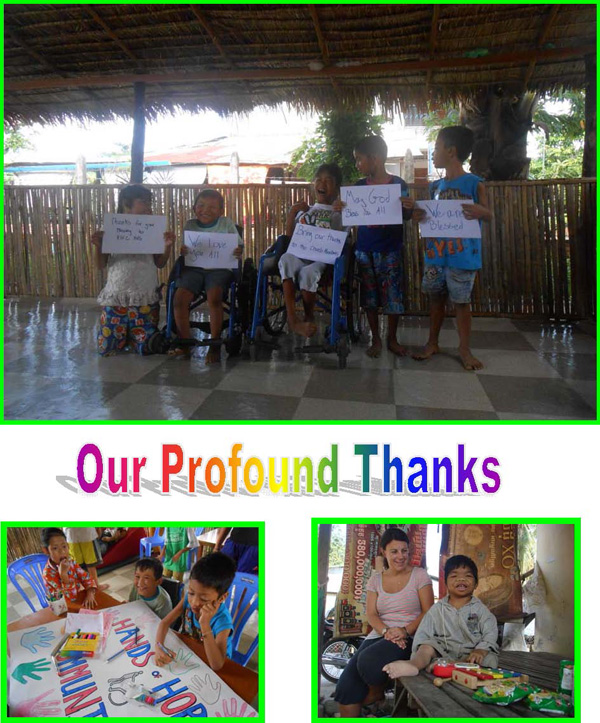- HOME
- Alumni News
- Activity Reports
- Activity Report of Sarin san(Cambodia)
Activity Reports
Activity Report of Sarin san(Cambodia)
ជនំយៃនកួី្ត មស្រមបឹសហគមន់៍សងឃ
 HANDS OF HOPE COMMUNITY
HANDS OF HOPE COMMUNITY
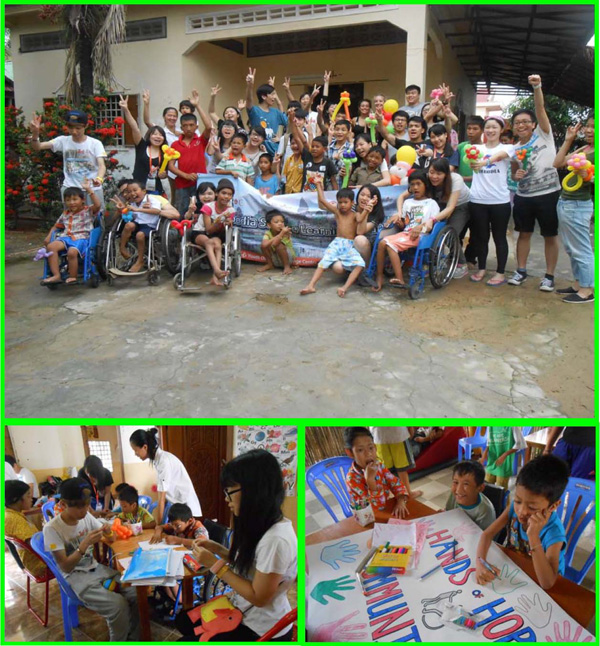
6 Month Progress Report on January‐June, 2014
| Foundations | Churches | Individuals |
| ‐Balima Foundation Regina & Alex Fischer ‐Cambodian Volunteer Foundation | ‐Charity Church Ermelo the Netherlands ‐Riverside church UK ‐Evangelism Lutheran Church of Cambodia ‐Cross Road Community Church in US | ‐Esther Pastores ‐Simonetta Tami ‐Mrs. Shery Limawarty ‐Mr. Lee Chaing Huat ‐Miky Junior ‐Peter Wyman |
1. Special Education at daycare center
The special education program responds to the needs of children and youth with moderate and severe disabilities. Presently there are 32 children in the program.
- 32 children with disabilities regularly attended the daycare and local schools activities; 13 children are girls and 19 children are boys
- There are 16 children (5 are girls), regularly attending the daycare program activities such as: life‐skill, art drawing, recreational activities and sport, which make them happy and enjoy. We have seen progresses in many children helping their families with some house works; helping to prepare school materials; and helping with cleaning in the center and kitchen area together with staff and volunteers.
- 16 children (8 girls) enrolled in home based care activities. This included an inclusive education program where all of them have been monitored/ followed up and recorded by supervisor, volunteers and special needs teachers.
- 32 children were provided nutrition food in every week (Soya milk), daily food (lunch) and snack (breakfast). Some children required medical care, and others were provided rehabilitation and life‐skill training activities.
- 6 children at the daycare received special therapy sessions enabling children to improve their mobility walking, moving around and sitting correctly.
- 7 children with intellectual disabilities received football training from the Star‐Fish Foundation. This is part of a national event related to sport activities.
- All 32 children were seen to have made progress checked against their Individual Education Plans, which are completed by staffs and special teachers.
- 5 children received medication from The Center for Child and Adolescent Mental Health (CCAMH) and the Russian Hospital; these medications helping to control fitting and reduce aggressiveness.
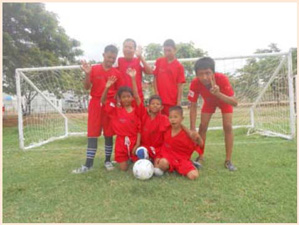
|
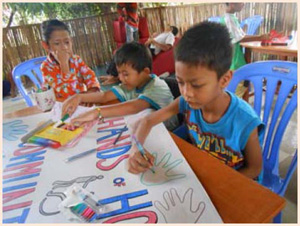
|
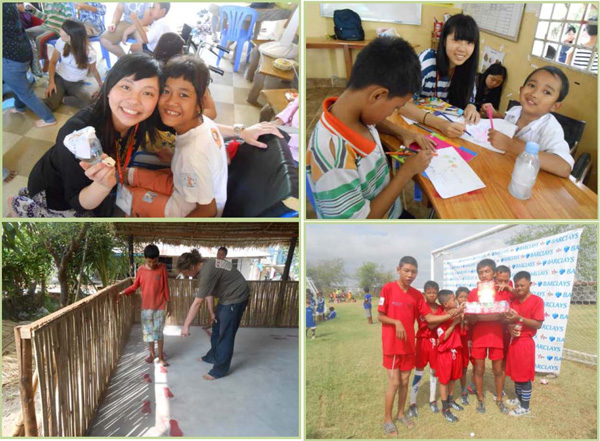
2. Home Based Care
- 16 children are presently registered for home‐based care, staff visiting families 2‐3 times a week in order to support children’s participation in activities and prevent isolation in the communities. Home based care services focused on improving Activities for Daily Living (ADL) through developing Individual Education Plans (IEP).
- All 16 families were trained on how to improve care for their children at home. Extra sessions were also provided about child protection and keeping children safe.
- 10 children were provided home therapy once a week by field staff and volunteers. Some children were referred by therapy staff for specialist rehabilitation services such as Variance International Cambodia (VIC) and The Cambodia Trust (CT).
- 6 children currently receive monthly medical care services through CCAMH, a specialist organization providing medical assessment for children with intellectual disabilities.
- All 16 children also attended the day‐care center once a month in order to participate in special events such Khmer New Year, International Children’s Day, and special recreational programs conducted by youth from local churches.
- 2 families were provided materials therapy aid and 4 particularly poor families were provided some rice, instant‐noodles, and fresh milk.
- All 16 children were provided learning material supplies, nutrition food, and snacks.
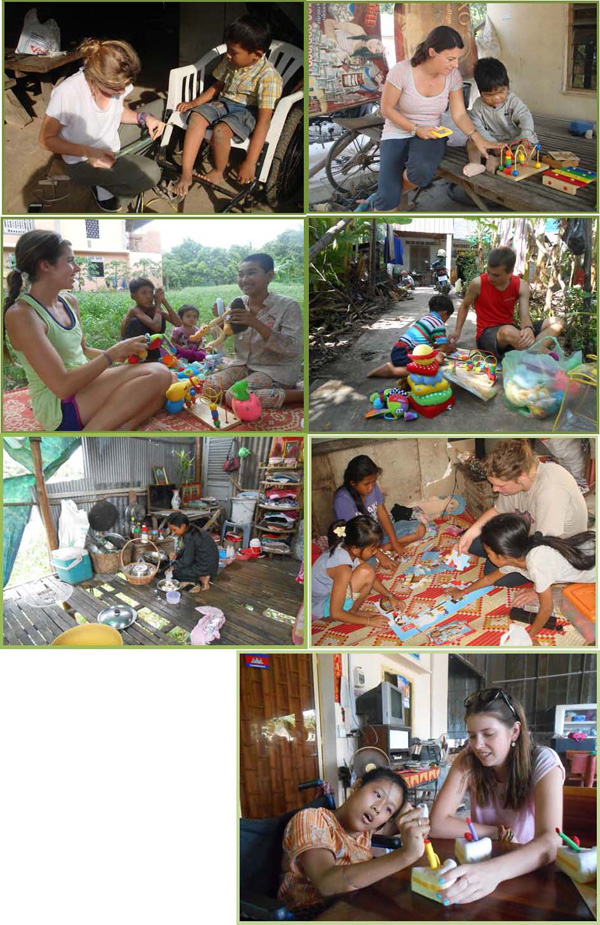
3. Awareness Raising and Advocacy
- Awareness raising has been conducted both locally and nationally: 32 children participated in National Autism Day in April, the event organized by the Disability Action Council and Disability sectors.
- 32 children were participated in the roll‐out of the National Disability Strategic Plan, which was presided over by the prime minister of the Kingdom of Cambodia.
- Mr. Sarin, Director, was invited to be the keynote speaker on National TV on 24th January about disability awareness, the importance of early intervention, disability and development. A further interview was conducted in May, promoting HHC organisation.
- Over the Khmer New Year (April 13‐15) 32 children, 20 parents and local people, played traditional games; the children were able to learn about their cultural while having fun with their families, volunteers and community people.
- 16 children, volunteers and staff visited the neighborhood and chatted with them in order to deduct the discrimination among the communities
- 25 children visited The Pizza Company and enjoyed having pizza together, many people in the restaurant were surprised to see disabled kids participate in the society, some congratulating HHC on conducting the outing. One customer donated $50 toward the children’s meal.
- One parent of an autistic child had a great opportunity to raise his concerns and challenges in parenting a child with intellectual disability, during a local radio interview.
- Many children in the community participated in our awareness activities, both at local schools and communities, there were also exchange visits among other children in the community.
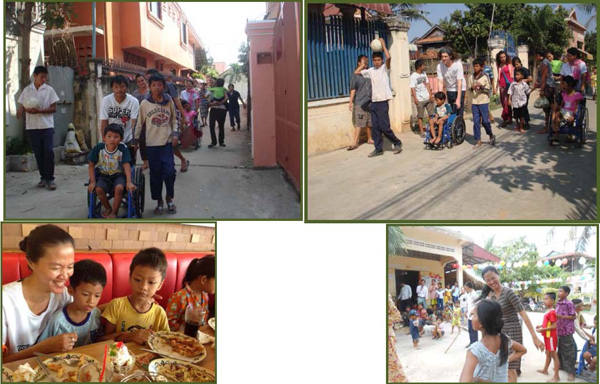
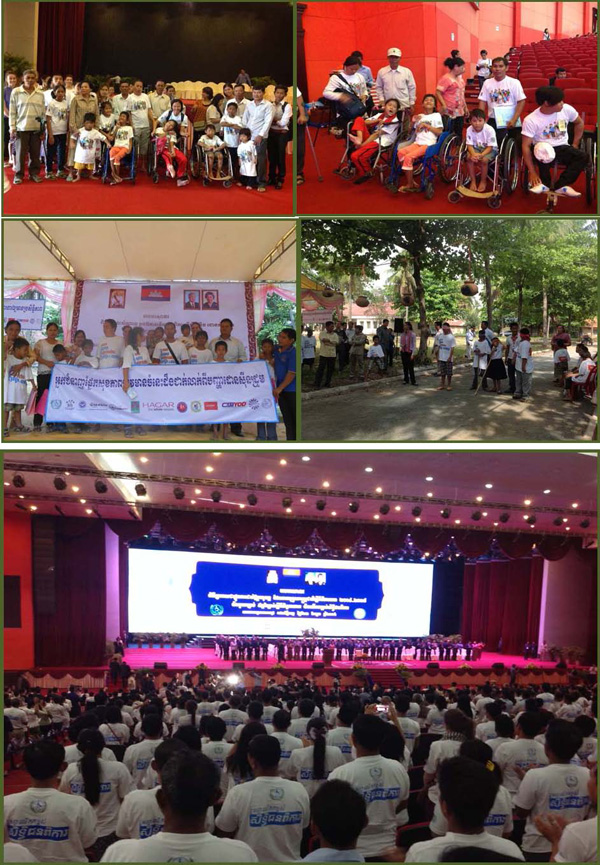
4. Parents Support Group

- 18 parents, divided into 2 groups participated in training about individual education planning; child assessment and disability prevention. The training included learning how to care for children in the home. Other training included causes of fits, accident prevention and early intervention.
- Monthly Parent Support Group (PSG) meetings were conducted, the aim being to share about the children’s progress, challenges, sharing information and making recommendations to the program. Most parents gained new experiences related to advocacy in the community, and many were brave to raise issues of discrimination in their locality.
- Two parents volunteered to help at the daycare, this also helping them to learn good practices which they are able to apply at home.
- Three parent‐leaders attended a study tour at CABDICO about Self‐Help groups and income generation. CABDICO is an organization that works for children with disability in Kep province.
- The PSG gained income from the saving scheme totaling $ 650.00; 3 parents loaned funds from the group in order to start a small business to support their families.
- The status of the PSG was amended and duly validated by the Commune Council.
- Most children felt that HHC daycare is their home and a place where they can learn and share with each other.
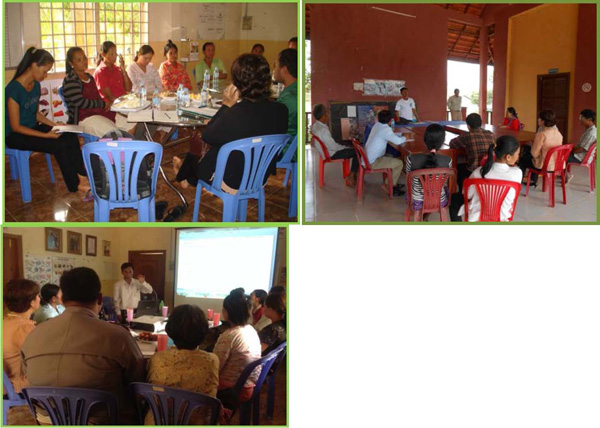
5. Toy Library Program

- During this report period a toy library was established as a place where parents or guardians could borrow a variety of good quality toys, puzzles or games, designed to support children’s development and promote learning through play and supporting a child’s skill development and imagination (Play, Learn and Grow.. together). These toys, puzzles and games can be enjoyed at home or in a group, especially in families of children with and without disabilities. In HHC’s short experience of only 6 months, we observed that the Toy Library encouraged togetherness of families through quality time spent playing with children.
- 32 children with disabilities and more than 200 local school students had chance to access the toy library and were happy to learn and play together.
- 16 children in home based care assessed the mobile toy library, children in the neighborhood also benefitted in play.
- At least 3 times a week 16 children in daycare were able to access the toy library with support from volunteers. Each child is allowed 45 minutes playtime, 2‐children per session. One or two volunteers are needed to stand by in the toy library to make sure there is good coordination of play activities.
- Some parents borrowed toys from our library to play at home with their own children.
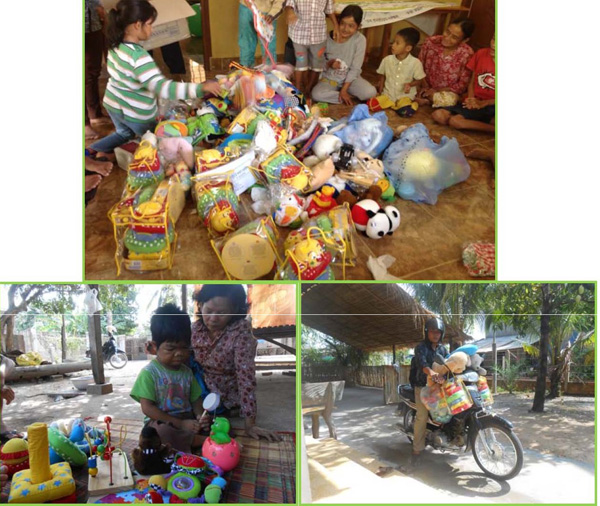
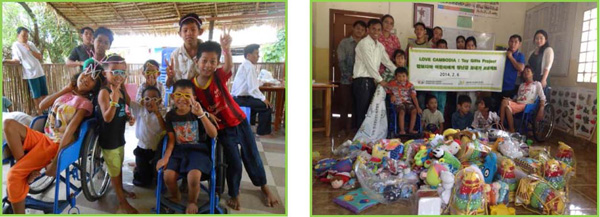
6. Major Achievements related to Management and Governance
- HHC management team and board began the process of strategic planning. It is anticipated that the strategic plan will define the organisation’s directions and objectives for the next 3‐5 years. As part of the planning process the HHC mission, vision and values statements were also reviewed.
- In preparation for the strategic plan parents, children, and a number of other stakeholders in the disability sectors were interviewed concerning their perspectives and experience of the HHC program. (The full report is available on request)
- An external audit was conducted by finance staff of World Vision. Overall there were good results concerning implementation, though several recommendations were made which will be followed up by the board treasurer.
- Policy development ? Human Resource and Administration guidelines were drafted. These, together with the finance guidelines will be finalized and approved by the board by the end of 2014
- One staff and one volunteer were trained in art therapy and speech therapy, this training being conducted by CCAMH.
- 16 volunteers applied to worked with HHC through Cambodian Volunteer Foundation (3 volunteers in every month) responsible as child care, training staff, therapy specialist, and special education which there are one from Switzerland, four from Australia, two from France, three from Canada, one from USA, two from Ireland, one from England, two from Scotland and one from New Zealand.
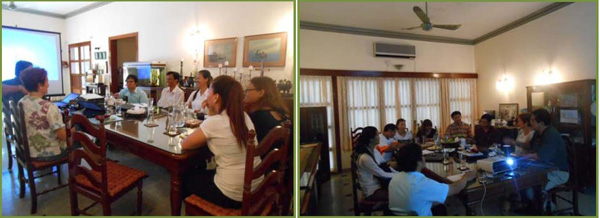
Boards and staff had a meeting for a strategic plan

On the ways to interview with families of the children and volunteers are interviewing now
